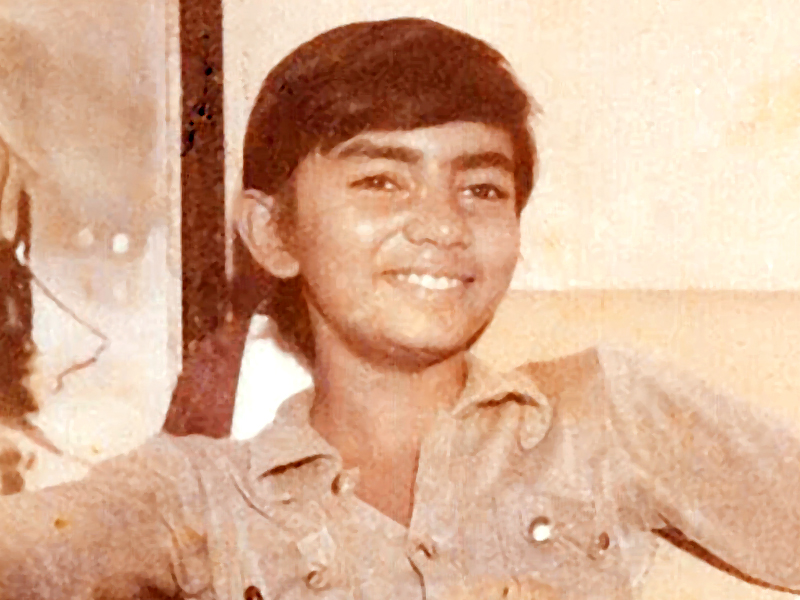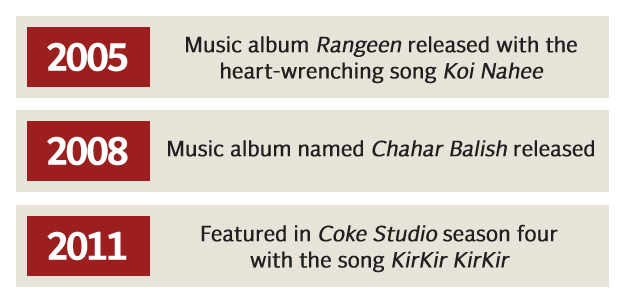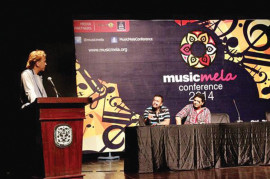
KARACHI:
The year 2014 marks 35 years of singer Sajjad Ali weaving magic through music. Timely and providing a retrospective glance at the music virtuoso’s career trajectory, his latest offering is a revamped version of his timeless hit Bolo Bolo as Kya Dekha. Comprising shots from his previous music videos, the song seems to be Sajjad’s tribute to himself.
On this occasion, we talk to Sajjad and his brother, musician Waqar, to take a stroll down memory lane and revel in the illustrious music that Sajjad has produced over the past three and a half decades.
“The key to my success has been to remain modest and comfortable with whatever you have achieved,” Sajjad tells us. “I have always been grateful to Allah for everything that has come my way and that is also the reason why He has blessed me with one milestone after another” he adds.
In 1993, Sajjad and Waqar had no idea how things would unfold when they were recording the song Babia. It was their take on the Arabic track De Dedia, which they made, not because it was a great song to replicate and launch an album with, but because their mother wanted to listen to the same song in Punjabi. It’s a fact confirmed by Sajjad himself.
What followed were white joggers, a Boombox and riveting dance moves by the maestro and his pals. For many, this marked the arrival of Sajjad, but he had already been a part of the industry for 15 years as he released his first album Master Sajjad Ali Sings Classics in 1979 at the age of 13. Since then, he has never looked back and his latest song Har Zulm Tera Yaad Hay (2013), which became an instant hit, is a testament to this.
The versatility of Sajjad’s music makes it difficult for anyone to classify his genre as a musician as he has given us a flavour of everything during his career. The one song that has stood the test of time and is played at almost every other underground gig even two decades after its release is Bolo Bolo.
“The reason why Bolo Bolo became such a huge success was because it was the first Pakistani rock song that received mainstream acceptance. Not that there weren’t other rock songs, but those couldn’t really grip the masses” explains Sajjad.
From Chief Saab to Cinderella, Sajjad has gifted us with one hit song after another. He stayed relevant during a time when his contemporaries such as Vital Signs and Junoon and Awaz were also making good music. With a few gaps in between, he consistently carried on and gave new-age pop musicians who arose during the Indus Music days a run for their money with songs such as Sohni Lag Di and Paniyon Mein.

“I have never done a lot of back-to-back work in my career. I feel that kills the soul of your expression,” shares Sajjad. “These days, the average life of a song is one week, so instead of releasing a song or video every month, I’d release one that lasts longer than many average songs. That’s just my style.”
What bothers Sajjad is that budding artistes depend on technology for music and he believes that in this rat race for better studio equipment, musicians these days are keeping away from good songwriting.
“You’ll laugh if I tell you the kind of equipment on which Har Zulm was recorded,” he laughingly says. “No matter what the genre may be, songwriting will remain the central idea behind memorable music and that can only be improved with more exposure to all sorts of music and a yearning for experimenting.”
Sajjad Ali’s love for the martial arts
If you remember the video of Chief Saab, then you’ll also remember how smoothly Sajjad played nunchaku and threw some flying kicks in it. Well, that’s how Sajjad expressed his dedication to different forms of fighting and he has been a regular taekwondo student at Ashraf Tai’s academy.
“He used to learn lessons there and apply them on me and other siblings at home,” Waqar says. “He had received various achievements in taekwondo, but certainly couldn’t reach the level of having a black or brown belt,” he explains.
However, his yearning to learn different combat practices didn’t stop there as he, along with his brothers, read taekwondo books and watched Bruce Lee films to learn the martial arts. So much so that even Waqar could play with double nunchakus.
“We used to guess Bruce Lee films after looking at a certain fight sequence,” shares Waqar. “Such activities inculcated in us a strong passion for fighting to an extent that the martial arts became our second love after music.”






 Published in The Express Tribune, May 22nd, 2014.
Published in The Express Tribune, May 22nd, 2014.Like Life & Style on Facebook, follow @ETLifeandStyle on Twitter for the latest in fashion, gossip and entertainment.
COMMENTS (11)
Comments are moderated and generally will be posted if they are on-topic and not abusive.
For more information, please see our Comments FAQ




































































Ali S - please do your research. Like i said you are only talking about whatever you've see on TV.
First of all go and check out Abbas Ali Khan's recently released album..so much work done on that..it has all the musicians from karachi to islamabad to lahore to peshawar on it- pop and folk both..decent songs? its an unprecedented piece of art for Pakistan but seldom mentioned. that album is what the standard of contemporary classical music should be.
Faraz Anwar's instrumental album was released by Allan Holdsworth's record label globally - he hailed FA as the king of guitars in Asia. if you don't know the guy google him.. AH is the icon of prog-rock and acid jazz.
Then there is Qayaas - who have won awards from jack daniels, the only time Pakistan produced decent hardrock/metal. if you follow some international metal blogs goras have given them rave reviews.
Finally Sajid and Zeeshan - two state of the art electronica/alternative rock albums. got invited and performed at the Worldtronics 2008 festival in Germany.
If they are getting international recognition (and by international i don't mean bollywood coz most of their stuff is below a person's intellectual abilities), they must be doing something right...should be making something decent..no?
@originality?:
None of the guys you mentioned can write a semi-decent song in their own language. And world class? Haha, only if you think the world likes to listen to derivative secondhand rock in English with funny desi accents. The only real world-class 'rock' act that Pakistan has produced was Junoon, and even they relied on a professional poet (Sabir Zafar) for much of their songwriting. Sajjad Ali did plagiarize on some of his songs, I agree, but he's still a capable songwriter.
He is the only artist praised by many legends including Mastro Nusrat Fatih Ali Khan. A great voice from Pakistan - we want more music of him.
Well done ET, please do highlight no only music guru but also from Arts, Culture, Poets, Writer and Old Freedom Movement personalities. once again well done.
regards,
@originality?: Oh shut up! And ET excellent work.
It is an honor to write a comment about my favorite Singer of pop and ghazal, his voice is too good and he is a true patriot unlike other in the same field.
Lol..so much fuss about a straight rip off 'babia' and the Abba ripoff 'bolo bolo'..pak has this problem of making legends just like that..unoriginal..how wud he come up on an international stage? Imagine him standing side by side with eitherAbba or that guy who originally did babia in Arabic? Won't he come across as a cheap imitation?
I am not a sajjad hater or paki pop hater but the real talent- Abbas Ali khan qayaas, Faraz anwar, irtaash, sajid and Zeeshan and countless others - who actually are global standard - remain underappreciated. And we create legends just like that..whatevs running on the tv.
He is absolutely amazing......especially the way he sang Bolo Bolo on Pakistan Idol was brilliant.
Sajjad is king of all the kings
No doubt Sajjad Ali is one of the best pop singers of Pakistan and unfortunately he didn't get all that respect he deserved!